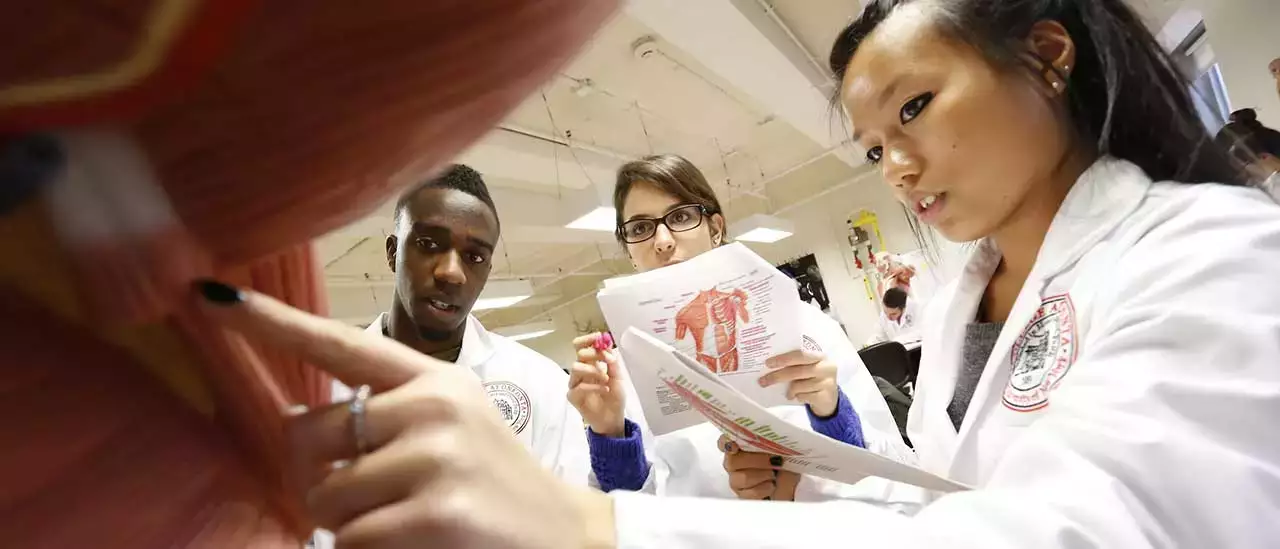SUNY Oneonta's Office of Health Careers provides specialized guidance and support for students preparing to apply to physician assistant school to be a Physician Assistant (PA).
Early Assurance
Highly qualified SUNY Oneonta applicants and students have the opportunity to apply to Albany Medical College Center for Physician Assistant Studies via the Early Assurance Program. Additional information, including qualifying criteria, can be found on our Health Professional School Articulation Webpage.
Who are Physician Assistants?
"Physician assistants are medical providers who are licensed to diagnose and treat illness and disease and to prescribe medication for patients. They work in physician offices, hospitals and clinics in collaboration with a licensed physician.
The physician-PA relationship is fundamental to the profession and enhances the delivery of high-quality health care. Because of their advanced education in general medicine, modeled after physician education, physician assistants can treat patients with significant autonomy.
Physician assistants also work in specialties outside of primary care, including medical and surgical specialties and sub-specialties."
- ExploreHealthCareers.org
Learn More
For additional information regarding schools of chiropractic medicine, visit What Is a PA?
Acceptance Rate
44% of SUNY Oneonta applicants were accepted into PA programs
(2021-2023 Advisor Report)
SUNY Oneonta students have recently attended the following PA Programs: Albany Medical College, Case Western Reserve University, Chatham University, Clarkson University, Drexel University, Le Moyne College, Marist College, Marywood University, Massachusetts College of Pharmacy and Health Sciences (MCPHS) – Boston, Mercy College, New York Institute of Technology, Pace University, Rutgers University, South College, St. Bonaventure University, St. John’s University, Stony Brook University, SUNY Upstate Medical Center, Temple University Lewis Katz School of Medicine, Touro College, Westfield State University, Yeshiva University.
Prerequisite Courses & Electives
Students must consult SUNY Oneonta's current undergraduate catalog for course descriptions, prerequisites, and time of year when courses are offered to plan properly in advance.
Prerequisites for Physician Assistant Programs:
- BIOL 1001: Investigative Biology Laboratory
- BIOL 1002: Cellular Perspectives in Biology
- BIOL 1004: Organismal Perspectives in Biology (Preferred) or BIOL 1006: Ecological and Evolutionary Perspectives in Biology
- BIOL 2000: Cell & Molecular Biology
- BIOL 2002: Genetics
- BIOL 3202: Human Anatomy & Physiology I
- BIOL 3204: Human Anatomy & Physiology II
- BIOL 3106: Microbiology or BIOL 2010: Elementary Microbiology
- CHEM 1111: General Chemistry I
- CHEM 1121: General Chemistry II
- CHEM 2212: Organic Chemistry I or CHEM 2262: Essential Organic Chemistry
- CHEM 3302: General Biochemistry or CHEM 4312: Biochemistry I
- COMP 1000: Composition
- PSYC 1000: Introductory Psychology
- SOC 1001: Introduction to Sociology or ANTH 1000: Intro to Cultural Anthropology
- STAT 1010: Introduction to Statistics
A minimum grade of C or higher is typically required in each prerequisite course, however grades of B or higher are recommended. Though a strong application includes a prerequisite and overall GPA greater than 3.4, programs are seeking applicants that are well-rounded in educational and life experience and can articulate an understanding of the career and vision for themselves in the Profession.
Physician Assistant education programs may change course prerequisites at any time and may have additional requirements, preferences, or policies that are not reflected in this prerequisite course list or on the AAPA General Prerequisite Course List. Programs may also allow applicants to substitute courses or choose different prerequisites. Applicants should review the program-specific details and contact programs directly to determine whether a particular course will fulfill a prerequisite.
Many Physician Assistant Programs require a 4-credit Microbiology; therefore it is recommended that even non-Biology Majors take BIOL 3106: Microbiology. Other courses required by some Physician Assistant Programs include Genetics and Medical Terminology.
Students have the responsibility to check entrance requirements for schools to which they intend to apply.
Physician Assistant Program Requirements
Students should regularly review the Physician Assistant Program Admission Requirements, including school specific Health Care Experience Requirements and other expectations to be considered a competitive applicant for PA Programs.
Applicants are evaluated on:
- healthcare experience : required direct patient care experience ranges from minimal to 1,000 hours or more
- it is increasingly common for students to work full-time in a Direct Patient Care role after graduating from undergrad to gain sufficient hours to be competitive applicants to PA Programs.
- minimum of three letters of evaluation
- Physician Assistant, Clinician, Professor in your Major, Health Care Job Supervisor
- GPA (specific calculation based on CASPA standardization)
- leadership skills (on and off campus)
- GRE
GRE Preparation
Many Physical Therapy Programs require the GRE General Test.
- GRE preparation options include free and paid test prep programs
- ETS offers free and paid test prep options
- SUNY Oneonta offers discounted GRE Test Prep
Application Timeline
Application to Physician Assistant programs is made through the centralized application CASPA
- The CASPA Application Cycle opens annually in late April for programs starting the following year.
- Applicants are encouraged to submit their CASPA as early in the cycle as possible (end of April/Very Early May) as it can take 4-6 weeks for your CASPA to be processed. Know that interview seats for prospective students at highly competitive programs are generally full before the end of August.
- Additional Information is available at FAQs for CASPA
Letters of Evaluation
Students generally request three to five letters of evaluation to be submitted on their behalf for physician assistant program applications. Appropriate evaluators include science faculty, other course instructors, healthcare professionals, current or former employers, and professional references.
